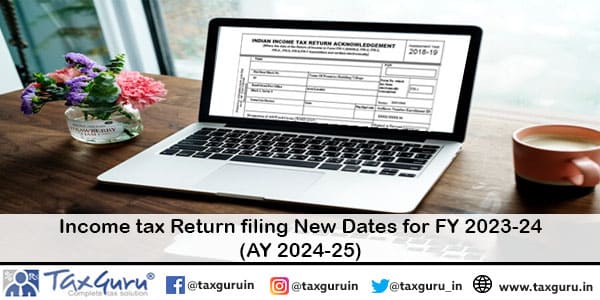Section 139 of Income Tax Act talks about Return of income and Section 139 (1) talks about Due dates to file Income tax Return in various cases including individuals, companies, partners, HUFs, AOAs and other assessee. This article explores the nuances of Section 139, including the standard due dates and the recent changes affecting the FY 2023-24.
The due dates stated under the said section are tabled below:
| Particular | Due Date |
| Asseessee including the partners of the firm or the spouse of such partner (if the provisions of section 5A applies to such spouse), being such assessee,] who is required to furnish a report referred to in section 92E | 30th day of November of the assessment year |
| any person other than a company stated above | 31st day of October of the assessment year |
| any other assessee (Including Individual) | 31st day of July of the assessment year. |
Change in Due Date to File Income Tax Return in FY 2023-24
With the new update the new regime is now default and assessee has to specially opt for the old regime. That means if you want to opt for the Old regime then you must file your Income Tax Return till the dates mentioned above.
Income tax Return filing New Dates for FY 2023-24 (AY 2024-25)
| Assessee | Due Date |
| Individual / HUF/ AOP/ BOI/AJP
(If Tax Audit not applicable) u/s 139(1) |
31st July 2024 |
| Businesses (If Tax Audit applicable) u/s 139(1) | 31st October 2024 |
| Businesses requiring transfer pricing reports
(in case of international/specified domestic transactions) u/s 139(1) |
30th November 2024 |
| Revised return u/s 139 (5) | 31st December 2024 |
| Belated Return u/s 139(4) | 31st December 2024 |
| Updated return u/s 139 (8A) | 31st March 2027 (2 years from the end of the relevant Assessment Year) |

Taxpayers currently have the option to opt for the old tax regime, but this choice is available only until the initial return filing deadline (Section 115BAC (6)). Here are the key points:
- Taxpayers who opt for the old regime must submit their Income Tax Return by the specified due dates mentioned in Section 139(1) corresponding to their respective categories.
- Once the choice is made for a prior tax year, it can be revoked only once, excluding the year in which the choice was made. Afterward, the decision becomes permanent, unless the taxpayer no longer earns any income from business or profession.
Conclusion: Section 139 of the Income Tax Act delineates crucial guidelines regarding return filing obligations and deadlines for various categories of taxpayers. Understanding the provisions of Section 139(1) and the recent changes for FY 2023-24 is paramount for ensuring compliance and avoiding penalties. Taxpayers must assess their options carefully, considering the implications of the old regime and the prescribed due dates, to fulfill their tax obligations efficiently.





